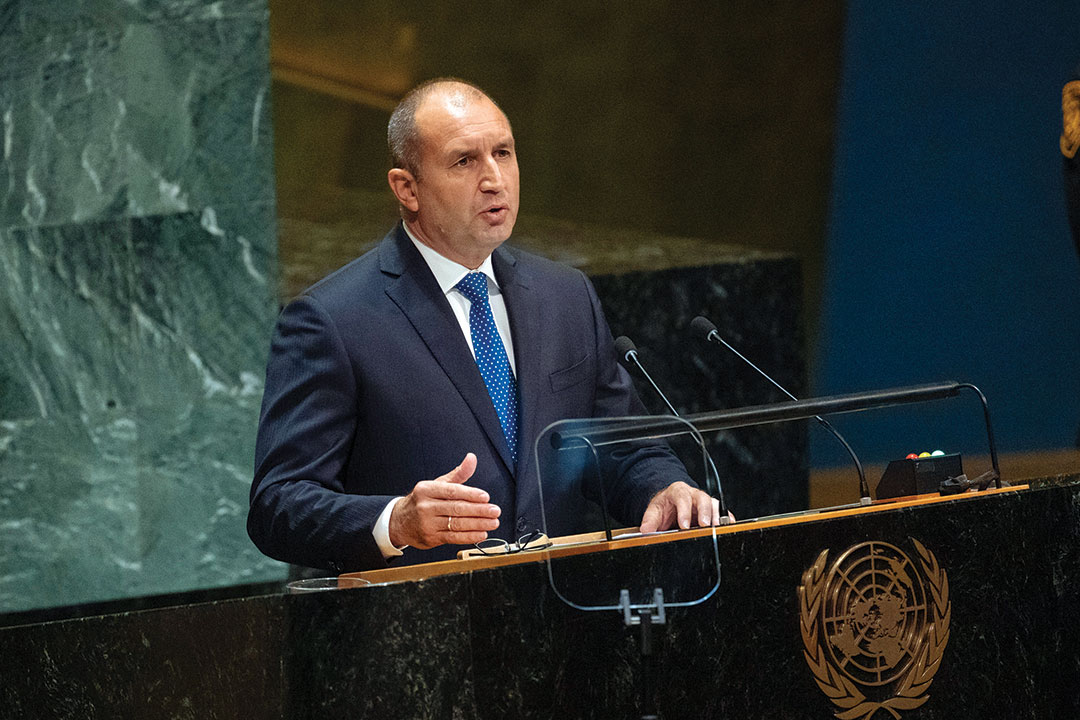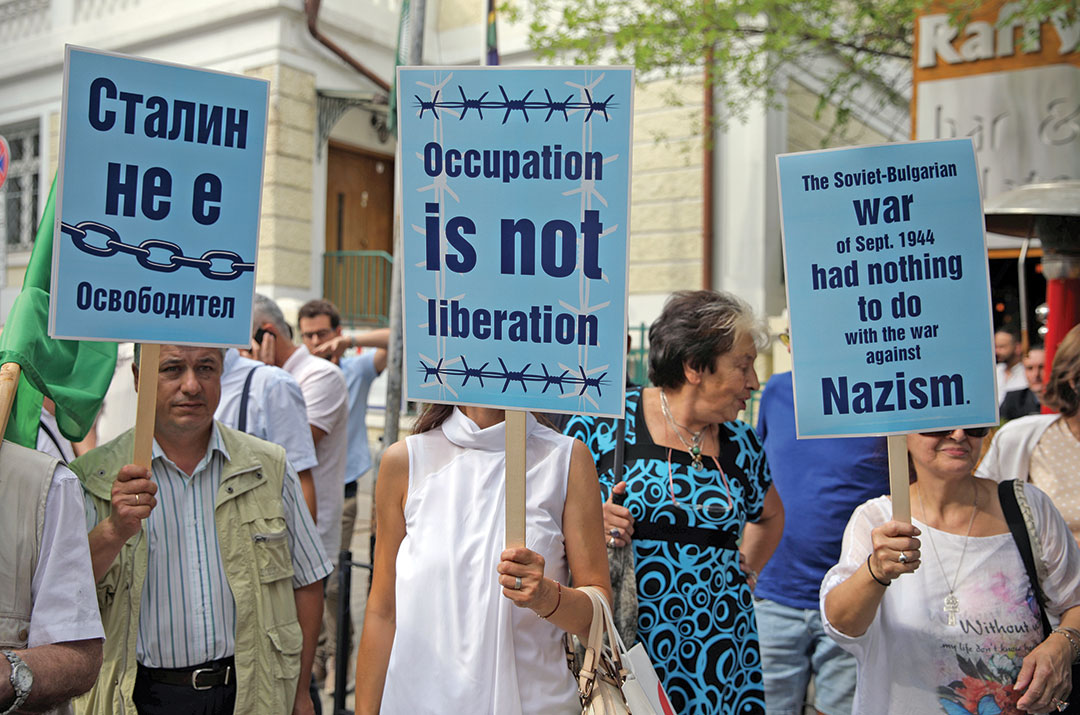Russia’s disinformation campaign in Bulgaria
By Vanya Denevska, parliamentary secretary, Bulgarian Ministry of Defence
In early 2018, Russian hybrid actions were stepped up to hinder the European integration of Western Balkan countries by exploiting historic relations and issues, as well as the unity of the Orthodox Church. For instance, the Russian Orthodox Church posted a video on its website of Russian Patriarch Kirill expressing his resentment of statements by Bulgarian President Rumen Radev, who had spoken of the roles that countries other than Russia had played in Bulgaria’s liberation from Ottoman rule. Kirill called Radev’s statements “false historical interpretations.” Later, the Russian news agency Tass circulated a speech in which Kirill emphasized that Bulgaria was liberated by Russia and not by “Poland, nor Lithuania, nor other countries,” overlooking the fact that soldiers from those countries had died in the fighting.
The messaging was part of a well-structured Russian hierarchical system that plans, develops and implements strategies for the coordinated use of military and nonmilitary instruments. Established lines of propaganda and disinformation are legitimized through Russia’s Ministry of Foreign Affairs, though the Kremlin has always denied its participation in activities aimed at molding public opinion. The techniques used in these disinformation campaigns include: distorting facts; degrading the image of targeted individuals and organizations; and launching entirely false allegations to confuse the public. Electronic, printed and broadcast media that are financially dependent on Moscow and political functionaries are actively involved in these campaigns. In the runup to the 2019 European elections in Bulgaria, Russia created Facebook pages to promote the pro-Russian Bulgarian Socialist Party (BSP). The pages are a source of fake news and are popular, with names such as “Let’s return Bulgaria to the Bulgarians.” These sites have anonymous owners and have become sources from which the disinformation stream starts. Subsequently, they are quoted by other media and on social networks. Through the sharing of trending commentary, an illusion is created that false claims are real facts. The goal is to provoke discussion in the official media that grows into a divisive public debate.

For example, tempers rose across social networks over an outbreak of African swine fever shortly after the European Parliament elections. Cornelia Ninova, leader of the BSP, accused Prime Minister Boyko Borisov of mocking people’s concerns about the virus. The outbreak became part of a disinformation campaign to politicize problems and weaken the pro-European government of Bulgaria. Those targeted are often individuals or organizations disturbed by Russia’s influence in former Soviet satellite states. The disinformation is concealed as official assessments and analysis of real events and processes.
It is quite clear that there was an intensification of Russian disinformation during the May 2019 European Parliament elections. The good news is that voters rejected the ugly face of Eurasianism. Two weeks before the elections, most polling agencies found even support for the two biggest parties in Bulgaria — GERB (pro-Europe) and BSP (pro-Russian) — while some polls, perhaps in bad faith, heralded support for pro-Soviet sentiments. For example, the main motto of the nationalist Ataka party’s election campaign was to remove the sanctions imposed on Russia. In the end, the parties questioning the pro-European direction for Bulgaria — the BSP, Ataka, ABV, Vuzrahzdane and Volya — suffered defeat.

Russia’s information operations are aimed at undermining Bulgarians’ public awareness about Bulgaria’s Euro-Atlantic choice and, consequently, influencing the political decisions of the Parliament and the government more directly. In the past three years alone, hundreds of cases of Russian interference in Bulgaria’s internal affairs, directly or indirectly, have occurred — through parliamentary and nonparliamentary political parties, leading politicians, key figures in the state administration, pro-Russian electronic and print media, websites, pro-communist Russophile organizations, Orthodox activists, internet trolls, oligarchs and criminal groups. Published reports by various analysts highlight the following topics in the media space:
- Bulgaria’s EU and NATO membership.
- Sanctions and countersanctions in connection with Russia’s war in Ukraine.
- Attitudes toward Syria and the Middle East.
The larger news sites in Bulgaria are positioned in the center and with a slight inclination toward Moscow, but Russian propaganda dominates among the smaller sites on the Bulgarian internet. There are hundreds of sites that spread Russian propaganda. Analysis of these sites shows that the 10 most popular are without clear owners and that they generate millions of clicks. This means that a large-scale misinformation and propaganda war is being waged against Bulgaria.
Disinformation campaigns were launched in 2019 around local elections in Bulgaria. During the campaign season, prosecutors announced an investigation into a Russian citizen accused of acquiring state-secret intelligence. As a result, a Russian diplomat, the first secretary at the Russian Embassy in Sofia, was recalled and left the country. Additionally, the chairman of the Russophile Movement, Nikolai Malinov, was accused of espionage. It later became clear that despite the accusation against Malinov, a judge had allowed him to travel to Russia to receive the Friendship Order at a special ceremony in the Kremlin. Prosecutors claim Malinov has worked for the benefit of two Russia-based organizations for nearly nine years. During searches, investigators found a note prepared by Malinov, written in Russian, in which he described the need for Bulgaria’s geostrategic reorientation toward Russia. The note included measures to achieve that end and asserted that the reorientation should be based on Orthodoxy, Slavic culture and traditions. It advocated for efforts to create nongovernmental organizations, internet sites, a television channel, a think tank and a political party. Subsequently, Russian oligarch Konstantin Malofeev, who is reportedly close to Russian President Vladimir Putin, was banned from entering Bulgaria for 10 years. Also exiled was Russian Gen. Leonid Reshetnikov, who is accused of coordinating Russian espionage operations in Bulgaria. The real winner in the 2019 election was the status quo: the major political parties and ruling coalition strengthened their positions. No changes are anticipated, and Bulgaria’s pro-EU and pro-NATO orientation is expected to remain stable.
In conclusion, similar influence campaigns by Russia can be expected. For example, on May 9, 2019, large numbers of pro-Russian Bulgarians celebrated the Day of Victory, even though Bulgaria lost World War II. The holiday was instituted when communist Bulgaria was politically subservient to the Soviet Union and officially cancelled in 1989 when the Soviet Union fell. The intensity of the Russian hybrid attacks and disinformation campaigns can be expected to increase. New ways to hide the source and the real intentions of operations will be created to expand the audience and provoke public debates in Bulgaria and around the world.


Comments are closed.